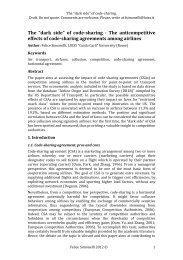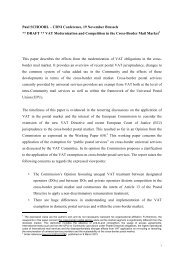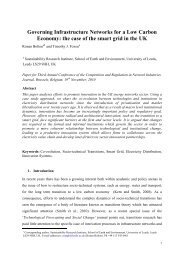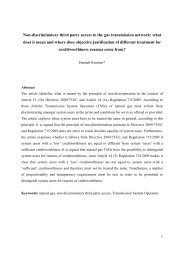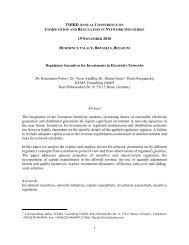The legal framework of services of general economic interest in the ...
The legal framework of services of general economic interest in the ...
The legal framework of services of general economic interest in the ...
Create successful ePaper yourself
Turn your PDF publications into a flip-book with our unique Google optimized e-Paper software.
<strong>economic</strong>, social and territorial cohesion, and solidarity among Member States». <strong>The</strong>se objectives,<br />
toge<strong>the</strong>r with <strong>the</strong> convergence <strong>of</strong> <strong>economic</strong> performance, must be achieved through an <strong>in</strong>ternal<br />
market. This is characterized by: i) <strong>the</strong> abolition <strong>of</strong> obstacles to free movement <strong>of</strong> goods, persons,<br />
<strong>services</strong> and capital among Member States; ii) a system which ensures that competition is not<br />
distorted; iii) <strong>the</strong> approximation <strong>of</strong> national laws necessary to its function<strong>in</strong>g; iv) a contribution to<br />
<strong>the</strong> streng<strong>the</strong>n<strong>in</strong>g <strong>of</strong> consumer protection. From <strong>the</strong> comb<strong>in</strong>ation <strong>of</strong> <strong>the</strong>se factors it seems possible<br />
to affirm how <strong>the</strong> liberalization <strong>of</strong> <strong>services</strong> <strong>of</strong> <strong>general</strong> <strong>economic</strong> <strong><strong>in</strong>terest</strong> on <strong>the</strong> one hand contributes<br />
to <strong>the</strong> objectives identified <strong>in</strong> art. 3, para. 3 TEU and, on <strong>the</strong> o<strong>the</strong>r hand, is a necessary means to<br />
achieve <strong>the</strong> same objectives. With<strong>in</strong> this ambit, an area without <strong>in</strong>ternal frontiers, <strong>in</strong> which <strong>the</strong> free<br />
movement <strong>of</strong> goods, persons, <strong>services</strong> and capital <strong>in</strong> accordance with <strong>the</strong> pr<strong>in</strong>ciple <strong>of</strong> an open<br />
market economy with free competition, allows <strong>the</strong> establishment <strong>of</strong> a common model for <strong>the</strong><br />
liberalization <strong>of</strong> <strong>services</strong> <strong>of</strong> <strong>general</strong> <strong>economic</strong> <strong><strong>in</strong>terest</strong> 18 .<br />
<strong>The</strong>se must be also considered <strong>in</strong> <strong>the</strong> light <strong>of</strong> art. 37 TFEU. It makes Member States to<br />
proceed <strong>in</strong> an adjustment <strong>of</strong> public monopolies with a commercial character, so that no<br />
discrim<strong>in</strong>ation results between nationals <strong>of</strong> Member States regard<strong>in</strong>g <strong>the</strong> terms <strong>of</strong> supply. It is<br />
addressed to Member States and to monopolies delegated to private operators. It does not impose<br />
total and unconditional abolition <strong>of</strong> monopolies. <strong>The</strong>ir ma<strong>in</strong>tenance, like that <strong>of</strong> exclusive or special<br />
rights, may be admitted under <strong>the</strong> condition that Member States comply with <strong>the</strong> provisions <strong>of</strong> <strong>the</strong><br />
Treaty, <strong>in</strong> particular, with those relat<strong>in</strong>g to competition. As a result, article 37 TFEU justifies certa<strong>in</strong><br />
exclusive rights to import and trade. It also concerns market monopolies <strong>of</strong> goods hav<strong>in</strong>g<br />
commercial nature.<br />
Art. 37 TFEU must be analyzed <strong>in</strong> comb<strong>in</strong>ation with art. 106 TFEU. Its first paragraph deals<br />
with <strong>the</strong> monopolies <strong>of</strong> goods <strong>of</strong> a non-commercial orig<strong>in</strong>, service monopolies and special rights. It<br />
affirms that Member States shall nei<strong>the</strong>r enact nor ma<strong>in</strong>ta<strong>in</strong> <strong>in</strong> force any measure contrary to<br />
competition rules. Its second paragraph conta<strong>in</strong>s an exception. This is addressed to companies<br />
which provide <strong>services</strong> <strong>of</strong> <strong>general</strong> <strong>economic</strong> <strong><strong>in</strong>terest</strong> and not to Member States. Even this rule <strong>of</strong>fers<br />
an exemption from competition rules when <strong>the</strong>y do not cause prejudice to <strong>the</strong> development <strong>of</strong> trade<br />
<strong>in</strong> <strong>the</strong> <strong>in</strong>ternal market and when <strong>the</strong>y are compatible with <strong>the</strong> Treaty, <strong>in</strong> order to achieve certa<strong>in</strong><br />
goals deemed worthy <strong>of</strong> protection. In o<strong>the</strong>r words, <strong>the</strong> prediction <strong>of</strong> a preferential regime <strong>in</strong> l<strong>in</strong>e<br />
with <strong>the</strong> pr<strong>in</strong>ciple <strong>of</strong> proportionality shall be strictly necessary and shall aim to <strong>the</strong> completion <strong>of</strong> a<br />
clear mandate to meet a specific <strong><strong>in</strong>terest</strong>. Its pursuit should justify <strong>the</strong> subjugation, by <strong>the</strong><br />
undertak<strong>in</strong>gs, to special rules, different from those normally applicable to firms operat<strong>in</strong>g <strong>in</strong> similar<br />
conditions.<br />
Article 106 para. 3 TFEU gives <strong>the</strong> Commission exclusive powers that are not subjected to<br />
limitations under <strong>the</strong> pr<strong>in</strong>ciple <strong>of</strong> subsidiarity provided by art. 5 TEU. <strong>The</strong> power to take actions<br />
aga<strong>in</strong>st Member States grant<strong>in</strong>g to companies exclusive rights, that are contrary to <strong>the</strong> provisions<br />
conta<strong>in</strong>ed <strong>in</strong> <strong>the</strong> Treaty, is essential <strong>in</strong> <strong>the</strong> liberalization processes.<br />
With regard to secondary law, <strong>the</strong> open<strong>in</strong>g to competition <strong>of</strong> <strong>services</strong> <strong>of</strong> <strong>general</strong> <strong>economic</strong><br />
<strong><strong>in</strong>terest</strong> must be placed <strong>in</strong> <strong>the</strong> <strong>legal</strong> and socio-<strong>economic</strong> path by Directive 80/723/EEC on <strong>the</strong><br />
transparency <strong>of</strong> f<strong>in</strong>ancial relations between Member States and <strong>the</strong>ir public enterprises 19 . Accord<strong>in</strong>g<br />
to it, all bus<strong>in</strong>esses, whe<strong>the</strong>r public or private, must operate <strong>in</strong> conditions <strong>of</strong> perfect equality,<br />
consecrat<strong>in</strong>g <strong>the</strong> primacy <strong>of</strong> competition rules on monopolies and exclusive rights and special<br />
rights.<br />
18 ‟Green Paper on <strong>the</strong> Liberalization <strong>of</strong> Telecommunication Infrastructures and Cable Television Network”, COM<br />
(1994) 440 f<strong>in</strong>al.<br />
19 Commission Directive 80/723/EEC <strong>of</strong> 25 June 1980 on <strong>the</strong> transparency <strong>of</strong> f<strong>in</strong>ancial relations between Member<br />
States and public undertak<strong>in</strong>gs (O.J. 1980 L 195/35-37).<br />
8



